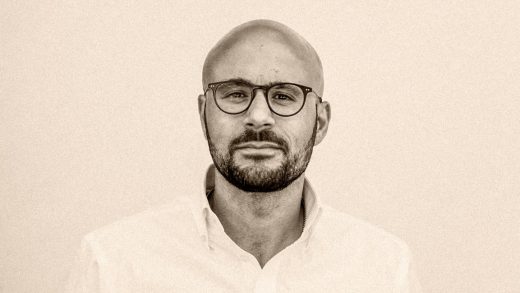New CNN show spotlights cultural discourse beyond tourism’s beaten path
This Sunday at 10 p.m., CNN will premiere the new travel docu-series Nomad With Carlton McCoy. Produced by Christopher Collins and Lydia Tenaglia, the team behind the network’s much-loved Anthony Bourdain: Parts Unknown, the new six-episode culinary travel show follows McCoy, the president and CEO of Heitz Cellar and a celebrated trailblazer in the wine world, through the banlieues of Paris, the South Korean countryside, Washington, DC, Ghana, Toronto, and the Mississippi Delta on a journey of discovery—connecting the dots between art, music, food, and culture.
One of the youngest people and only the second African American to achieve Master Sommelier status in 2013 at 28-years-old, McCoy, who is also a classically trained chef, is the first Black CEO of a Napa Valley winery.
Fast Company caught up with McCoy recently in New York ahead of a fundraising charity auction for The Roots Fund, a non-profit organization he co-founded, which is dedicated to providing resources to “Black and Brown scholars interested in the wine industry” through financial support and mentorship. We talked about travel and filming during the pandemic, personal growth, and how McCoy finds time to do it all.
This interview has been edited for length and clarity.
What was it like, filming a travel show during the pandemic?
I love to travel, and not being able to travel for over two years, it was like working old muscles—it felt familiar, but was also a little bit odd being in different places and around foreign languages. The [production] team made it very easy, but with protocols changing daily, every country had its own thing, so we were very careful. We were optimistic that once this thing was actually going to air, we would be in a much better place in the world.
Considering the profound legacy of CNN’s previous travel shows as well as the amazing production team behind Nomad, going into the process of filming your first season, what were some of your own intentions and expectations?
An old man in Athens taught me early on that disappointment has a direct correlation to expectations, so I always try to manage that part of it. I definitely went in with intention, but very little in the way of expectations. I used to think that was a hard way to live, but actually, you’re delighted by a lot more things than you are disappointed.
I wanted to ensure that I was never scripted or trying to act—I wanted to be myself, whether it sounded better or not. I’d say I’m very optimistic. And we intentionally went to places where there was controversy and some turmoil—and we were able to touch on those things without, I think, creating a divide between people. We were able to celebrate the culture there while simultaneously discussing [history]. Sometimes, under the veil, there are still a lot of political issues—but does that mean you can’t celebrate the cultural result of a dark time?
I think the ability to interact in a civil manner with people who have different opinions has been lost—and on the show, we do intentionally interact with people who probably, politically, in some values do not align. Hopefully we can be civil about those things and learn how to interact, and also celebrate people who are not often celebrated.
Your first episode is filmed in the banlieues of Paris.
I was like: Look, I would love to go to Paris, but I don’t want to do business. So we took a deep dive, deeper than I’ve ever gone into it. We wanted to celebrate the real Paris of today versus the idea [of Paris] on a poster. The French lady who hangs out, like, smoking cigarettes is not the only thing that exists. Places are defined by the people who occupy it.
Even our crew was incredibly diverse—that was important for us. A lot of the directors and producers were people of color and female. All of it was really intentional.
What were some of your biggest takeaways from the experience?
All these places are incredible. People are awesome and I needed a reminder to engage. [During the pandemic] I got caught up in that whole social media thing—and you forget that we’re all human. Everyone is capable of going down the wrong path, being convinced of something, taking a side. [Media] is a business, they need to keep you looking, I get it, it’s the way the world is, people don’t want to watch the news if it’s showing all positives. But most people are pretty good and the world is rich and awesome.
Leading Heitz Cellar and hosting a CNN travel show at the same time—can you tell us about how you approach time management?
I have clinically diagnosed ADHD, and it’s a real thing, but I think it’s actually, like, power. What it allows me to do is to harness it and go from one thing to another very simply—stop, drop, and move onto something else completely and with extreme intensity. It’s what helps me go from meeting to meeting and be very present and able to focus on the next call—and then go back. It really is extremely helpful.
I also think very quickly, although there’s a downside to that—my therapist says, “You cut people off because you already know where they’re going. But out of respect you should let them finish.” I still do it.
I think in this job, in what I do now, it’s the first time I’ve been pushed to this level of intensity. I’ve worked hard my whole life. I don’t waste time. I really believe in being efficient—but really more than efficiency, I like optimizing my time.
Nomad With Carlton McCoy premiers on CNN at 10 p.m. on May 1.
Fast Company , Read Full Story
(32)



